Alien: Covenant (2017) - Scott
The most annoying part of this revived Ridley Scott franchise is not its first two (and many more to come I assume) shitty movies. It's the Hollywood hype machine to turn the shit into a digestible bits even before the new movie premieres. I saw two adverts floating on youtube that are not even included in the movie. The movie obviously can't stand on its own legs, so they have to have some kind of backing that ultimately doesn't end up in the final product. I guess only slightly but not much interesting part of this pile of shit is a Fassbender on Fassbender action: David, an android from Prometheus teaches Walter, the newer version of the same model how to play flute - "Just blow in the hole, I'll do the fingering." Fingering in the hole indeed does Ridley Scott with the revival of the franchise that should've died with Prometheus.
The highlight of the film is in the beginning few minutes, by killing off James Franco in a cryo chamber in his sleep (he appears in an advert though). But everything is downhill from there. I went in to be mindlessly entertained and all I got is unwanted pseudo philosophizing and lackluster thrills. Alien: Covenant is a huge pile of crap.
Tuesday, May 30, 2017
Monday, May 29, 2017
Cold Fish
La Truite (1982) - Losey
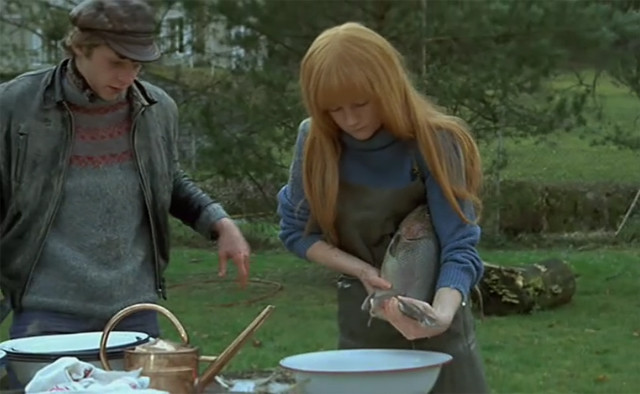
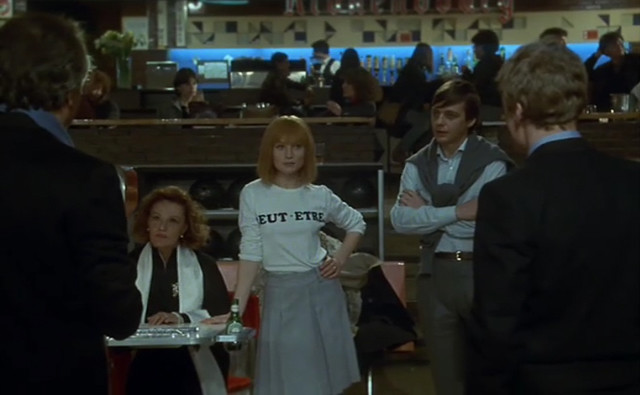
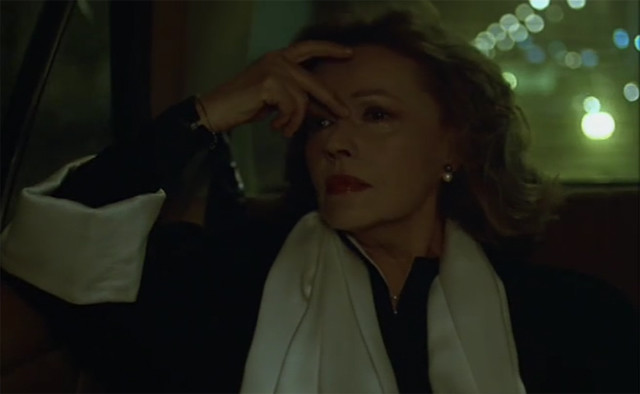
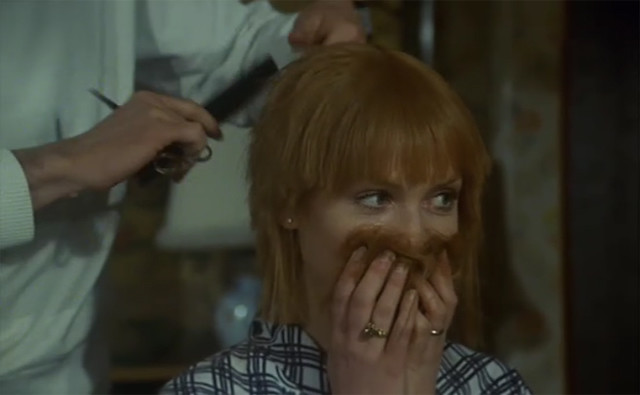
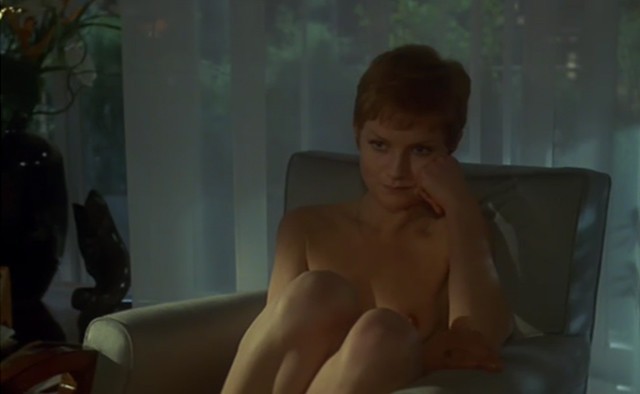
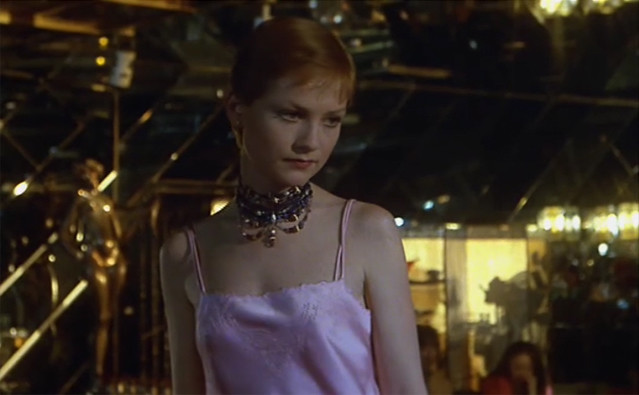
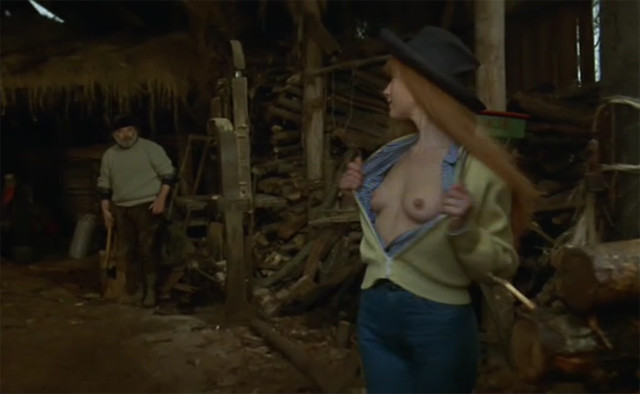
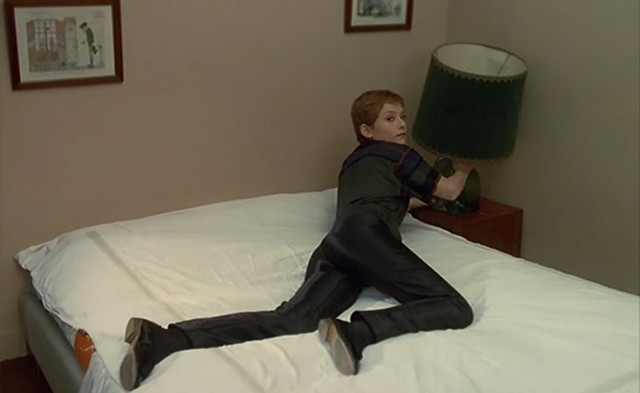
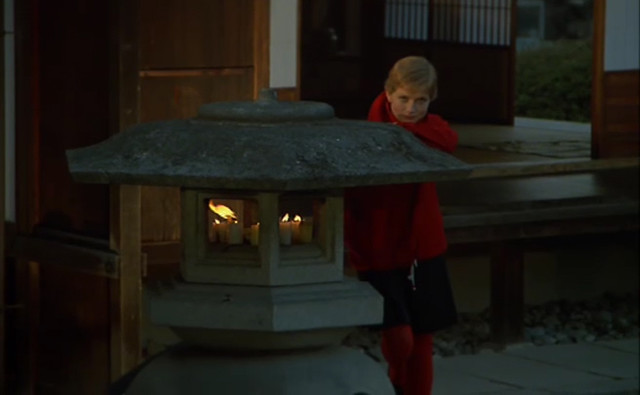
From what I've read, Joseph Losey planned adaptation of Roger Vailland's book of the same name with Brigitte Bardot in mind. He got to make it much later with the one and only, Isabelle Huppert. The choice of Bardot makes a lot of sense to play a sexpot who can't be controlled by surrounding men and like a trout, would slip away from their grasp. But she would've been too obvious of a choice and the movie would've been less interesting. La Truite, instead, is a much more nuanced film about sexual power play, finding love in the cold society and fraternity of women.
Frederique (Huppert) works at a trout farm in the rural area. She is young and married to an effeminate young man, Galuchat, who grapples with his sexuality and has suicidal tendencies. Frederique is also disgusted by her father and his friend's behavior among village girls- 'taking them to his chalet' has an ugly connotation in her mind. It is revealed in constant flashbacks that she belongs to 'carefree girls club' where they perform rituals and swear to each other never give men what they want. It's maybe or never. Galuchat and Frederique meet an old couple, Rambert (Jean-Pierre Cassell) and Lou (Jeanne Moreau) and their friend St. Genis (Daniel Olbrychski), a rich business man while bowling. Rambert and St. Genis are immediately smitten by Fred. St. Genis offhandedly suggests to take Fred to his business trip to Japan. Rambert is mad jealous and Lou is pissed at Rambert. Fred rummages through high society and wreck a havoc.
Off they go to Japan. Fred soaks in her first plane ride and exotic culture and all the luxury St. Genis provides for her. But she never gives him what he wants. Because Galuchat's suicide attempt, Fred and St.Genis come back to France. Rambert and Lou are in the fritz because of Fred. Lou and Fred bond over their mutual understanding of men's folly.
It's all Huppert though. Her mixed naivete and nonchalance makes a hell of a complex, beguiling character. She can be brutal in kicking old pervert's balls several times but also can be remorseful after throwing the man's stuffed trophies out the window and seeing him cry. Another strong film that demonstrates Huppert's talent and charm.









From what I've read, Joseph Losey planned adaptation of Roger Vailland's book of the same name with Brigitte Bardot in mind. He got to make it much later with the one and only, Isabelle Huppert. The choice of Bardot makes a lot of sense to play a sexpot who can't be controlled by surrounding men and like a trout, would slip away from their grasp. But she would've been too obvious of a choice and the movie would've been less interesting. La Truite, instead, is a much more nuanced film about sexual power play, finding love in the cold society and fraternity of women.
Frederique (Huppert) works at a trout farm in the rural area. She is young and married to an effeminate young man, Galuchat, who grapples with his sexuality and has suicidal tendencies. Frederique is also disgusted by her father and his friend's behavior among village girls- 'taking them to his chalet' has an ugly connotation in her mind. It is revealed in constant flashbacks that she belongs to 'carefree girls club' where they perform rituals and swear to each other never give men what they want. It's maybe or never. Galuchat and Frederique meet an old couple, Rambert (Jean-Pierre Cassell) and Lou (Jeanne Moreau) and their friend St. Genis (Daniel Olbrychski), a rich business man while bowling. Rambert and St. Genis are immediately smitten by Fred. St. Genis offhandedly suggests to take Fred to his business trip to Japan. Rambert is mad jealous and Lou is pissed at Rambert. Fred rummages through high society and wreck a havoc.
Off they go to Japan. Fred soaks in her first plane ride and exotic culture and all the luxury St. Genis provides for her. But she never gives him what he wants. Because Galuchat's suicide attempt, Fred and St.Genis come back to France. Rambert and Lou are in the fritz because of Fred. Lou and Fred bond over their mutual understanding of men's folly.
It's all Huppert though. Her mixed naivete and nonchalance makes a hell of a complex, beguiling character. She can be brutal in kicking old pervert's balls several times but also can be remorseful after throwing the man's stuffed trophies out the window and seeing him cry. Another strong film that demonstrates Huppert's talent and charm.
Death by Bad Art
Bird with the Crystal Plumage (1970) - Argento
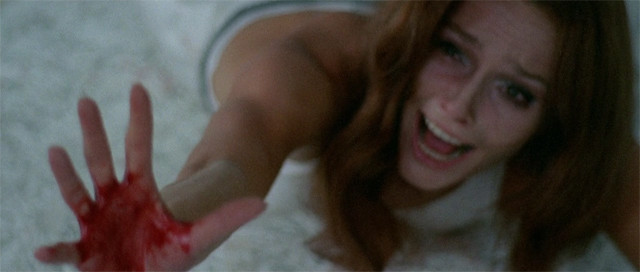
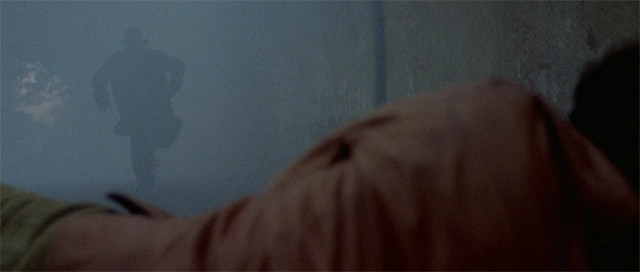
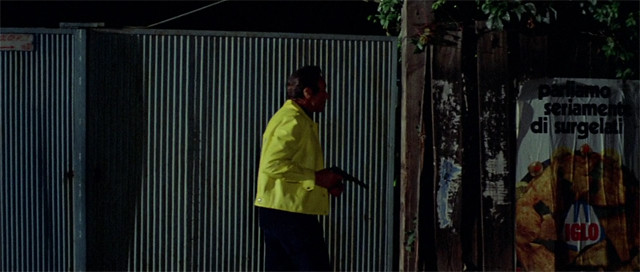
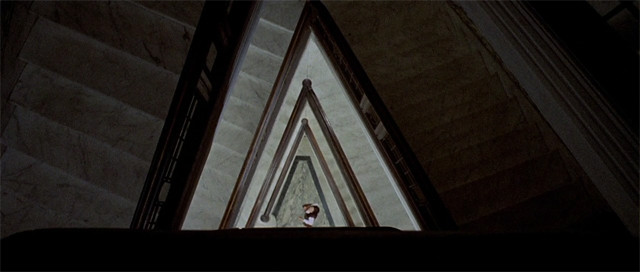
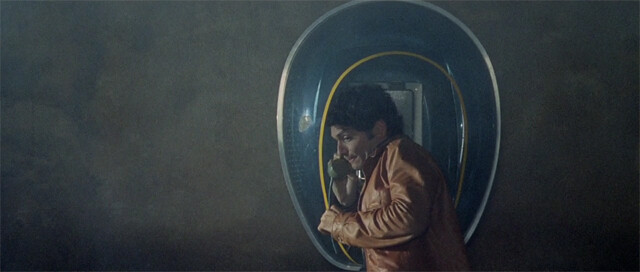
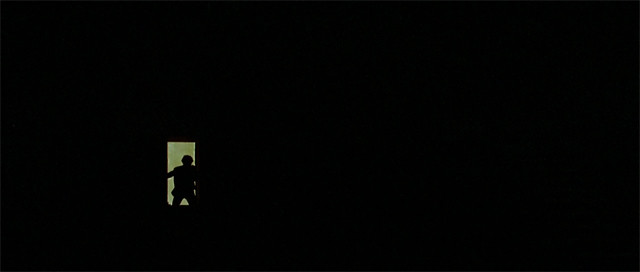
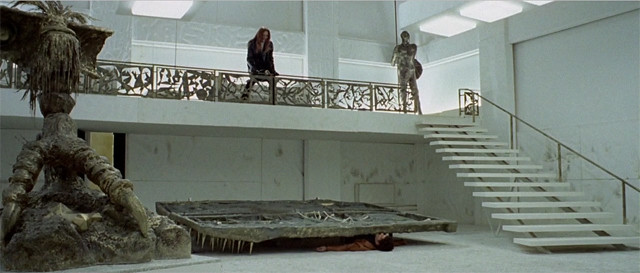
The serial killer is on the loose and an American man (Tony Musante) witnesses a near murder of a beautiful woman (Eva Renzi) in an empty gallery from outside the glass window at night. The incident leaves a great impression on him and he decides to postpone his return to the US and start his own investigation. As usual in a giallo, there are plenty of red herrings and pretty girls getting murdered along the way.
The use of architecture and art Bird with colors and framing, the Crystal Plumage is perhaps one of the most accomplished, stylish debut feature of all time. It contains all of the Dario Argento signature of his later classics and can still be counted as one of his very best. Renzi is appropriately freaky. A great giallo.







The serial killer is on the loose and an American man (Tony Musante) witnesses a near murder of a beautiful woman (Eva Renzi) in an empty gallery from outside the glass window at night. The incident leaves a great impression on him and he decides to postpone his return to the US and start his own investigation. As usual in a giallo, there are plenty of red herrings and pretty girls getting murdered along the way.
The use of architecture and art Bird with colors and framing, the Crystal Plumage is perhaps one of the most accomplished, stylish debut feature of all time. It contains all of the Dario Argento signature of his later classics and can still be counted as one of his very best. Renzi is appropriately freaky. A great giallo.
Wednesday, May 24, 2017
Visual Journal of Raymond Depardon
Journal de France (2016) - Depardon
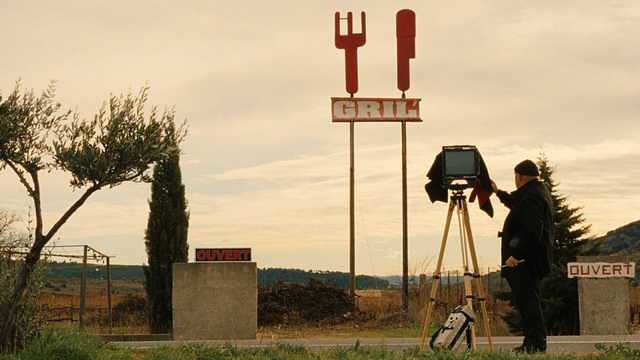
An intimate portrayal of a journalist, photographer, filmmaker Raymond Depardon as he embarks on a tour of his country with his large format still camera. Unseen narrator is his long time collaborator/wife/Sound recordist Claudine Nougaret. It's both journey through time and intimate portrayal of Depardon and his unending curiosity around the world and at home. Depardon's assembled, mostly handheld reportage takes us to various political hotspots around the world since the 60s - Venesuela, Chilé, Czechoslovakia, Congo, Djibouti, South Africa and a lot more. It also illustrates the artist's obsession with the desert with all it represents. We get to see how Depardon and Nougaret hooked up through various stock footage. It's a great doc that avoids being a sentimental nostalgia piece. Great Saturday morning movie it turns out to be.

An intimate portrayal of a journalist, photographer, filmmaker Raymond Depardon as he embarks on a tour of his country with his large format still camera. Unseen narrator is his long time collaborator/wife/Sound recordist Claudine Nougaret. It's both journey through time and intimate portrayal of Depardon and his unending curiosity around the world and at home. Depardon's assembled, mostly handheld reportage takes us to various political hotspots around the world since the 60s - Venesuela, Chilé, Czechoslovakia, Congo, Djibouti, South Africa and a lot more. It also illustrates the artist's obsession with the desert with all it represents. We get to see how Depardon and Nougaret hooked up through various stock footage. It's a great doc that avoids being a sentimental nostalgia piece. Great Saturday morning movie it turns out to be.
Thursday, May 18, 2017
The Great Western Pathos
Day of the Outlaw (1959) - de Toth
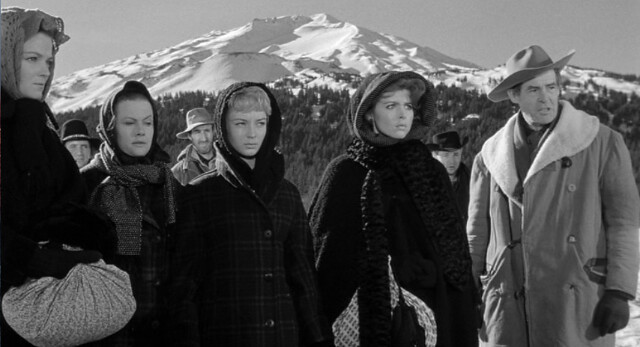
The self-righteous anger and violence has been a staple pathos for the Western genre. This tough male victimhood is as privileged and outdated as white supremacy movement that is rampant in this country. One can't deny that America is built on violence but no one wants to admit it. All highly regarded Westerns follow pretty much the same pathos - The Searchers, The Man Who Shot Liberty Balance, etc. Andre de Toth's Day of the Outlaw is no exception but it makes a hero out of Robert Ryan's gruffy rancher without ever firing a gun. So kudos for that.
Ryan plays Blaise (more like Blasé), a hardened rancher who's had enough of Crane, a farmer and husband of his former lover Helen (Tina Louise), encroaching his territory. Blaise has no qualms about shooting down Crane just on principle alone. But a group of outlaws, headed by former army captain Bruhn (Burl Ives), rolls into town, just in time for Blaise & Crane showdown and start terrorizing its twenty or so citizens of the small town. Bruhn's men are thirsty and lusty. But perhaps because he knows that he is dying, Bruhn promises the townsfolk that his men will not touch the booze and women, until they have secured a safe passage, away from trailing calvary. Blaise, knowing that Bruhn's death will commence raping and pillaging, urges the town's horse doctor to extract the bullet from Bruhn's chest and keep him alive as long as he can.
After a night of dancing and some molestation of women, Blaise decides to deceive the gang and lead them to certain death in the mountain, promising that there is a secret safe passage through the snowy mountains. Greedy and trigger happy, the gang starts to kill each other off.
Day of the Outlaw is a great western. Top notch acting from Ryan and Ives and Louise is a real beaut. Snowcapped vista also accentuates the harshness of the American west.

The self-righteous anger and violence has been a staple pathos for the Western genre. This tough male victimhood is as privileged and outdated as white supremacy movement that is rampant in this country. One can't deny that America is built on violence but no one wants to admit it. All highly regarded Westerns follow pretty much the same pathos - The Searchers, The Man Who Shot Liberty Balance, etc. Andre de Toth's Day of the Outlaw is no exception but it makes a hero out of Robert Ryan's gruffy rancher without ever firing a gun. So kudos for that.
Ryan plays Blaise (more like Blasé), a hardened rancher who's had enough of Crane, a farmer and husband of his former lover Helen (Tina Louise), encroaching his territory. Blaise has no qualms about shooting down Crane just on principle alone. But a group of outlaws, headed by former army captain Bruhn (Burl Ives), rolls into town, just in time for Blaise & Crane showdown and start terrorizing its twenty or so citizens of the small town. Bruhn's men are thirsty and lusty. But perhaps because he knows that he is dying, Bruhn promises the townsfolk that his men will not touch the booze and women, until they have secured a safe passage, away from trailing calvary. Blaise, knowing that Bruhn's death will commence raping and pillaging, urges the town's horse doctor to extract the bullet from Bruhn's chest and keep him alive as long as he can.
After a night of dancing and some molestation of women, Blaise decides to deceive the gang and lead them to certain death in the mountain, promising that there is a secret safe passage through the snowy mountains. Greedy and trigger happy, the gang starts to kill each other off.
Day of the Outlaw is a great western. Top notch acting from Ryan and Ives and Louise is a real beaut. Snowcapped vista also accentuates the harshness of the American west.
Tuesday, May 16, 2017
Chip on His Shoulder
Moonrise (1948) - Borzage
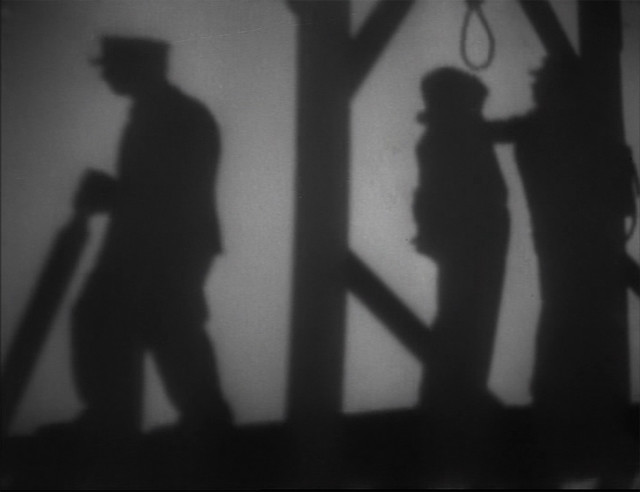
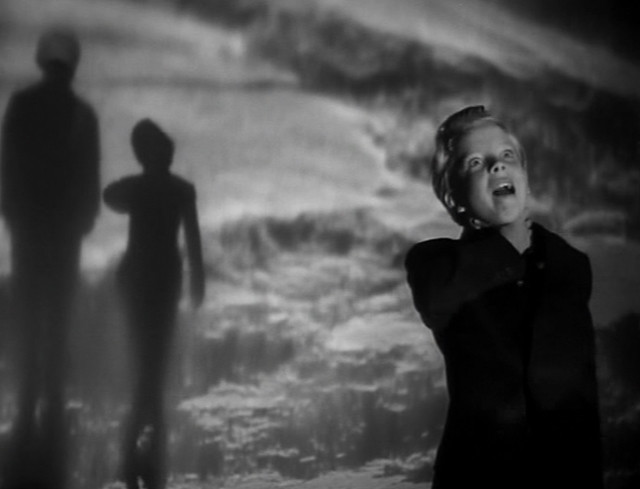
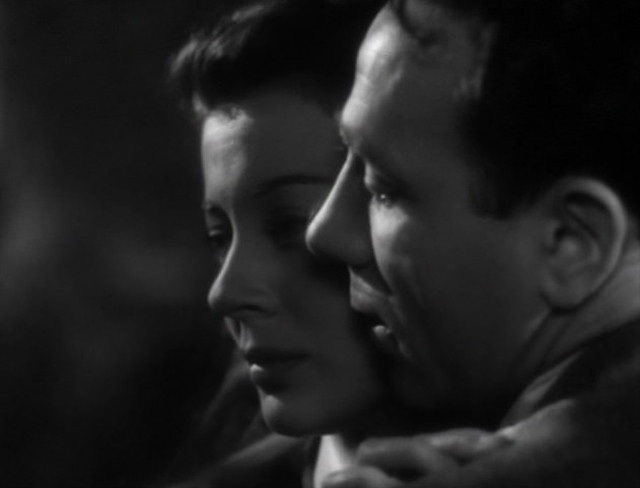
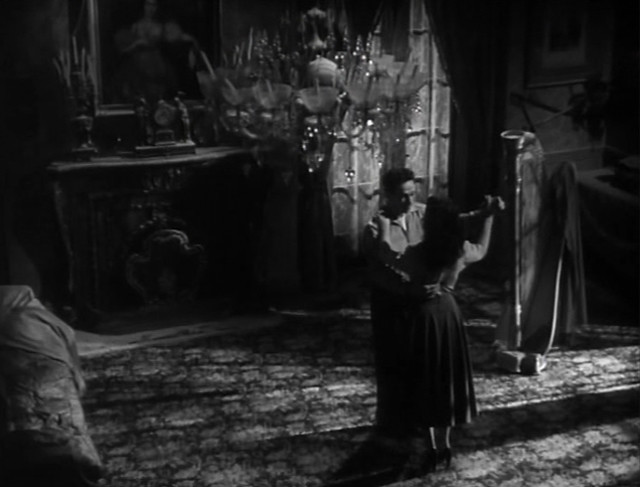
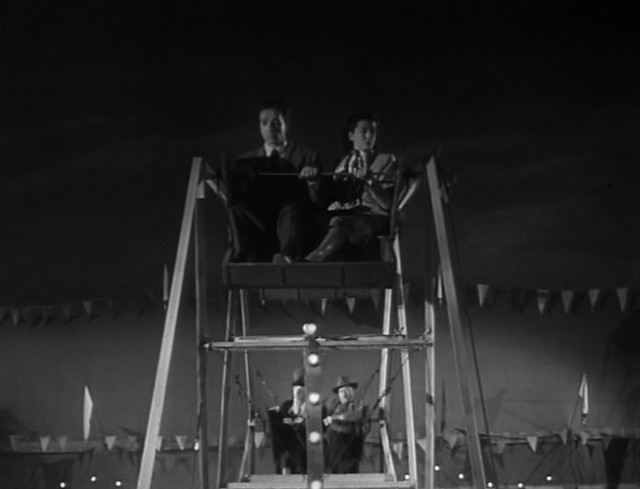
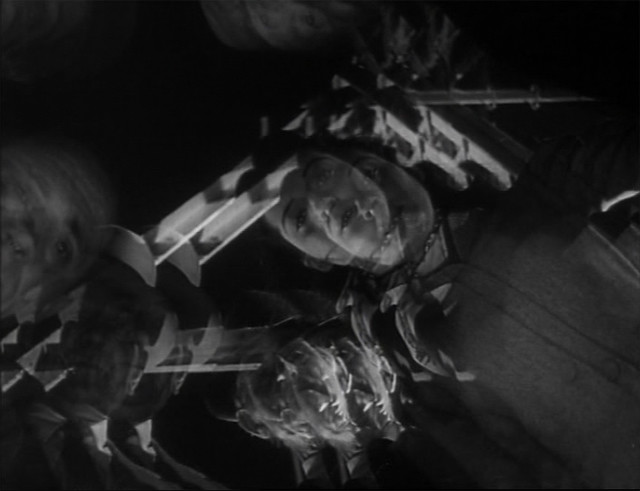
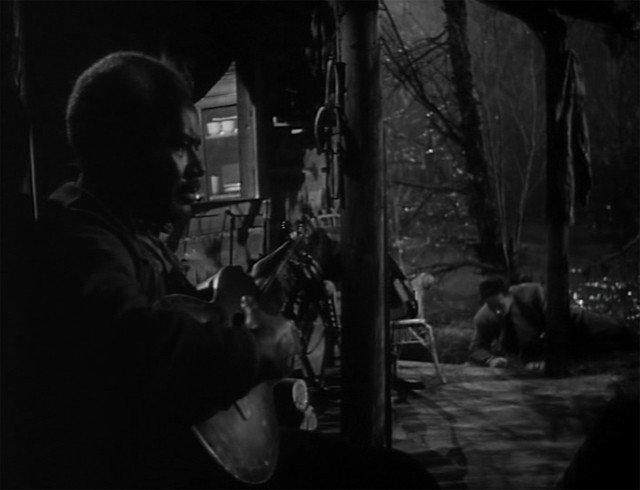
Danny (Dane Clark) has been fighting against a stigma of being a son of a murderer who was hanged- as a child, he was relentlessly bullied and grew up to be a young man with a major chip on his shoulder. He gets into a fight during social dance and ends up killing Jerry, a local rich banker's son (Lloyd Bridges) who's been tormenting him all his life. Danny starts romancing Gilly (Gail Russell), a comely school teacher and Jerry's sweetheart, who's been having feelings for Danny and sees goodness underneath his erratic behavior and moody nature. Soon enough, local sheriff suspects him of foul play and closes in on him. Still struggling with his father's demise, Danny blames the bad blood running in his family for his predicament.
Moonrise starts with an ominous shadowplay and its dark, moody photography never lets up until the very end. Its redemptive plot is nothing to write home about, but there are several beautiful details that makes the film stand out. It's indoor shot southern backwoods has its stagey appeal (with swamps and everything). The foretelling and suggestive dialog/singing reflects Danny's increasing paranoia is quite delicious. It has several poignant moments involving the village idiot (Harry Morgan) Danny projected himself to, animals - coons and bloodhounds, sage black man Mose (Rex Ingram) who has the best lines in the film.
There are several striking scenes in the film that highlights Borzage's skill as a highly visual filmmaker. Most notable ones are the swooping crane shot of Danny and Gilly dancing in a derelict mansion and of course, Danny going crazy on a ferris wheel ride as he jumps off from his seat to the ground. Borzage's sensibility is close to that of Jean Cocteau and Jean Epstein than his Hollywood contemporaries. This could have been a great Farley Granger vehicle. I loved it and looking forward to delve into Frank Borzage's filmography.







Danny (Dane Clark) has been fighting against a stigma of being a son of a murderer who was hanged- as a child, he was relentlessly bullied and grew up to be a young man with a major chip on his shoulder. He gets into a fight during social dance and ends up killing Jerry, a local rich banker's son (Lloyd Bridges) who's been tormenting him all his life. Danny starts romancing Gilly (Gail Russell), a comely school teacher and Jerry's sweetheart, who's been having feelings for Danny and sees goodness underneath his erratic behavior and moody nature. Soon enough, local sheriff suspects him of foul play and closes in on him. Still struggling with his father's demise, Danny blames the bad blood running in his family for his predicament.
Moonrise starts with an ominous shadowplay and its dark, moody photography never lets up until the very end. Its redemptive plot is nothing to write home about, but there are several beautiful details that makes the film stand out. It's indoor shot southern backwoods has its stagey appeal (with swamps and everything). The foretelling and suggestive dialog/singing reflects Danny's increasing paranoia is quite delicious. It has several poignant moments involving the village idiot (Harry Morgan) Danny projected himself to, animals - coons and bloodhounds, sage black man Mose (Rex Ingram) who has the best lines in the film.
There are several striking scenes in the film that highlights Borzage's skill as a highly visual filmmaker. Most notable ones are the swooping crane shot of Danny and Gilly dancing in a derelict mansion and of course, Danny going crazy on a ferris wheel ride as he jumps off from his seat to the ground. Borzage's sensibility is close to that of Jean Cocteau and Jean Epstein than his Hollywood contemporaries. This could have been a great Farley Granger vehicle. I loved it and looking forward to delve into Frank Borzage's filmography.
Thursday, May 11, 2017
Holy Cinema, in the Subtlest Possible Way
La niña santa/The Holy Girl (2004) - Martel
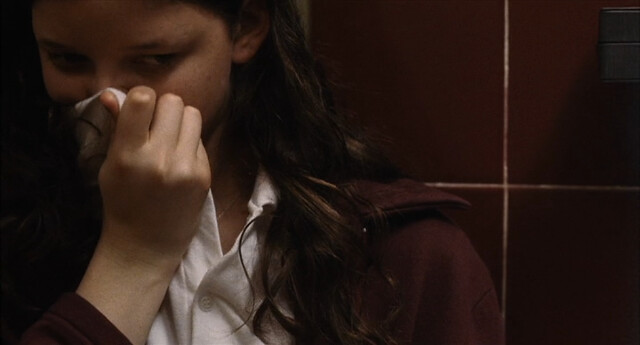
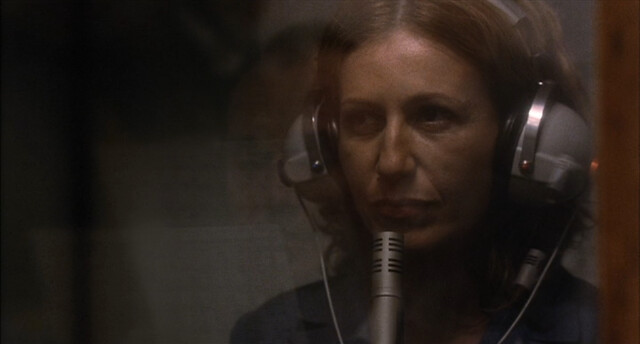
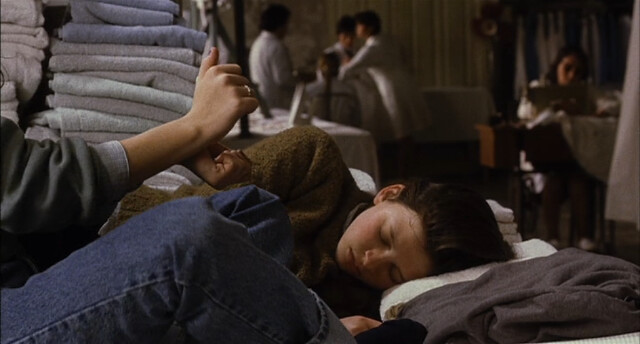
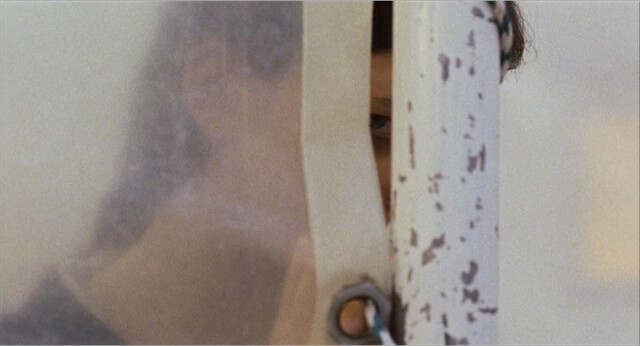
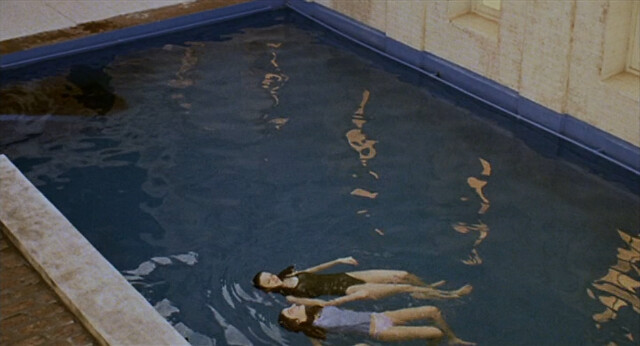
Amalia (María Alche), a sullen teen girl, lives with her divorced mom Helena (Mercedes Morán) in an old hotel with a thermal pool where mom works as a representative. She attends bible study group with her catholic school girl friends and recite prayers under her breath obsessively. Lately, she is obsessed with 'vocation'. A ear-nose-throat doctors convention is taking place in the hotel. Amalia finds herself being an interest of Dr. Jano (Carlos Belloso), a married man with kids, when he rubs against her bottom in the crowd gathered for a theremin player just outside the hotel. On the verge of sexual awakening with the help of a promiscuous, gossipy best friend Jose(fina), the experience leaves her not repulsed but curious.
She soon becomes obsessed with Jano, sneaking into his shared room, smelling his shaving cream, following him and spying on him at the poolside. Whatever this man means to her, her obsession becomes her 'vocation'. Jano's guilty conscience is not helping Amalia's cause. To make matters worse, Helena finds him attractive as well.
Martel proves to be the master of close-ups and shallow focuses. The details of the senses and small moments she captures on screen - touch, smell, whispers make up the film's superbly orchestrated, organic feel. All the connective tissues of the film are all spread out- the fact doctors are ear-nose-throat specialists - whispers and misheard information, smell, singing, but her approach is so subtle and fluid, you can't help but admire her skills. The Holy Girl is about Amalia as much as it isn't. The film's sordid details of the lives of middle class bourgeoisie can be seen as Almodovar-esque melodrama. But as in all Martel's films there is always a it's-barely-there-but-there satire. I can't really think of any director working today who works on Martel's level. The Holy Girl is a true cinematic feat!





Amalia (María Alche), a sullen teen girl, lives with her divorced mom Helena (Mercedes Morán) in an old hotel with a thermal pool where mom works as a representative. She attends bible study group with her catholic school girl friends and recite prayers under her breath obsessively. Lately, she is obsessed with 'vocation'. A ear-nose-throat doctors convention is taking place in the hotel. Amalia finds herself being an interest of Dr. Jano (Carlos Belloso), a married man with kids, when he rubs against her bottom in the crowd gathered for a theremin player just outside the hotel. On the verge of sexual awakening with the help of a promiscuous, gossipy best friend Jose(fina), the experience leaves her not repulsed but curious.
She soon becomes obsessed with Jano, sneaking into his shared room, smelling his shaving cream, following him and spying on him at the poolside. Whatever this man means to her, her obsession becomes her 'vocation'. Jano's guilty conscience is not helping Amalia's cause. To make matters worse, Helena finds him attractive as well.
Martel proves to be the master of close-ups and shallow focuses. The details of the senses and small moments she captures on screen - touch, smell, whispers make up the film's superbly orchestrated, organic feel. All the connective tissues of the film are all spread out- the fact doctors are ear-nose-throat specialists - whispers and misheard information, smell, singing, but her approach is so subtle and fluid, you can't help but admire her skills. The Holy Girl is about Amalia as much as it isn't. The film's sordid details of the lives of middle class bourgeoisie can be seen as Almodovar-esque melodrama. But as in all Martel's films there is always a it's-barely-there-but-there satire. I can't really think of any director working today who works on Martel's level. The Holy Girl is a true cinematic feat!
Sunday, May 7, 2017
A Puzzle Piece
Terrorizers (1986) - Yang
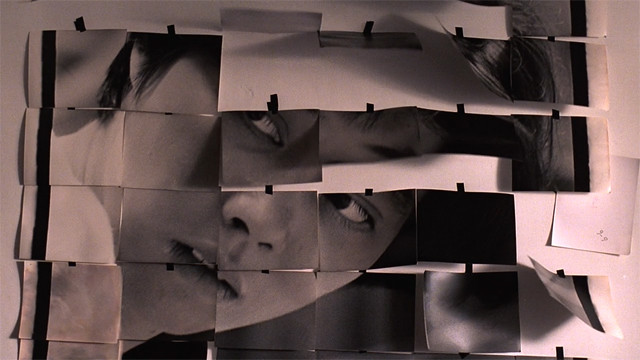
Some no good gang is holed up in a shady apartment, shooting people on the street at random. A young photographer takes pictures of a man shot dead on the street by the same gang. A fiction writer is having a writer's block, but her supportive but meekly doctor husband who is up for promotion doesn't understand what she's going through. Edward Yang's Terrorizers briskly, busily sets up the premise in the beginning twenty minutes. The film is a puzzle piece that doesn't resolve neatly, yet done in smart, intriguing way, you can't help but admire Yang's skills as a filmmaker.
In the center of it all is a young street hustler (Wang An) who alone escapes the police raid, but is captured by the young photographer's lens. She breaks her leg during her escape and put on a house arrest by her mother. So she spends her time prank calling people at random. The photographer who is obsessed with the girl in his photos, ends up breaking up with his girlfriend and moving into the shady apartment where the gang was holed up at, making it his dark room. The writer becomes a victim of the girl's prank call and it becomes the catalyst for her finishing the novel and leaving her husband.
It's the young photographer who pieces it together and informs the doctor about the girl who maybe responsible for his wife leaving. After that, the unhinged doctor, whose life is in shambles, carries out revenge, mirroring his wife's now famous novel.
On paper it reads like a sordid crime film very much akin to what the author says in an interview after she won the first prize, that she was "inspired by Japanese crime novels". But Terrorizers is nothing but. Everyone is well equipped with back stories and their motivations, except for the wayward youth with no moral compass, suggesting that this girl, the catalyst for everything that happens in the film might be the work of fiction, that her appearance is what people are wishing for in their daily tedious lives.
With Haneke like double take at the end, the film puts an emphasis on the fiction overtaking reality overtaking fiction. Ambitious and seductive, Terrorizers beckons me to watch more of the Taiwanese master's films.

Some no good gang is holed up in a shady apartment, shooting people on the street at random. A young photographer takes pictures of a man shot dead on the street by the same gang. A fiction writer is having a writer's block, but her supportive but meekly doctor husband who is up for promotion doesn't understand what she's going through. Edward Yang's Terrorizers briskly, busily sets up the premise in the beginning twenty minutes. The film is a puzzle piece that doesn't resolve neatly, yet done in smart, intriguing way, you can't help but admire Yang's skills as a filmmaker.
In the center of it all is a young street hustler (Wang An) who alone escapes the police raid, but is captured by the young photographer's lens. She breaks her leg during her escape and put on a house arrest by her mother. So she spends her time prank calling people at random. The photographer who is obsessed with the girl in his photos, ends up breaking up with his girlfriend and moving into the shady apartment where the gang was holed up at, making it his dark room. The writer becomes a victim of the girl's prank call and it becomes the catalyst for her finishing the novel and leaving her husband.
It's the young photographer who pieces it together and informs the doctor about the girl who maybe responsible for his wife leaving. After that, the unhinged doctor, whose life is in shambles, carries out revenge, mirroring his wife's now famous novel.
On paper it reads like a sordid crime film very much akin to what the author says in an interview after she won the first prize, that she was "inspired by Japanese crime novels". But Terrorizers is nothing but. Everyone is well equipped with back stories and their motivations, except for the wayward youth with no moral compass, suggesting that this girl, the catalyst for everything that happens in the film might be the work of fiction, that her appearance is what people are wishing for in their daily tedious lives.
With Haneke like double take at the end, the film puts an emphasis on the fiction overtaking reality overtaking fiction. Ambitious and seductive, Terrorizers beckons me to watch more of the Taiwanese master's films.
Saturday, May 6, 2017
Primordial
Womb (2017) - Barley
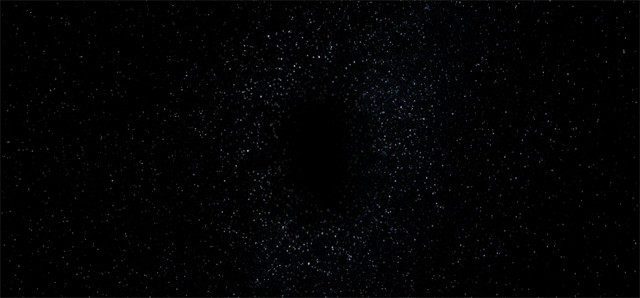
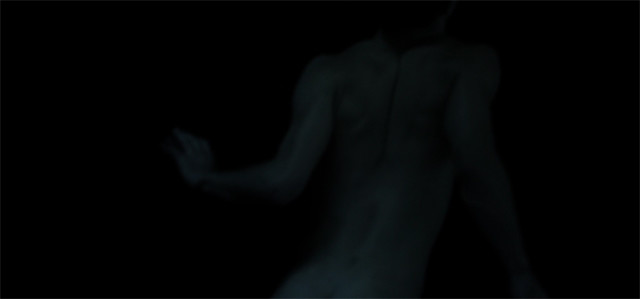
Scott Barley fixes his gaze from his native Welsh outdoors onto a human body in the darkness. Womb can be a little brother to Grandrieux's White Epilepsy, yet still unemcombered by narrative or genre conventions of traditional 'movie-making'.
There is a gaping hole in the universe in the shape of a womb. Barley's internalization of the universe is unwavering. With amazing sound design, Womb is another hypnotic concoction and nice addition to the prolific young artist's growing filmography. There is always something more primordial about Barley's work. His images are devoid of symbols or layered contexts but completely bare and visceral. And I like that about his films. Here he is furthering his cinematic adventure and exploring a new territory as an artist. I love it.


Scott Barley fixes his gaze from his native Welsh outdoors onto a human body in the darkness. Womb can be a little brother to Grandrieux's White Epilepsy, yet still unemcombered by narrative or genre conventions of traditional 'movie-making'.
There is a gaping hole in the universe in the shape of a womb. Barley's internalization of the universe is unwavering. With amazing sound design, Womb is another hypnotic concoction and nice addition to the prolific young artist's growing filmography. There is always something more primordial about Barley's work. His images are devoid of symbols or layered contexts but completely bare and visceral. And I like that about his films. Here he is furthering his cinematic adventure and exploring a new territory as an artist. I love it.
Ideal Version
Empathy (2016) - Rovinelli
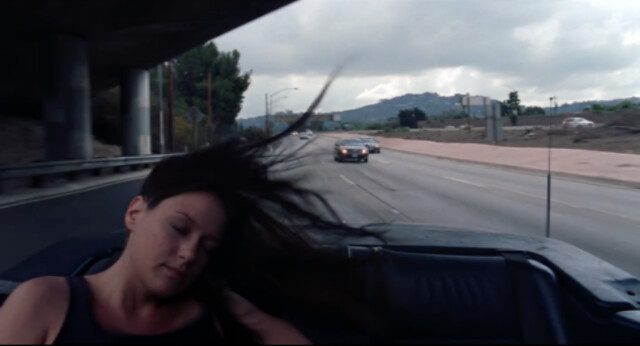
Em Cominotti works as an escort. In brief introduction in the beginning, we get to know her background a little bit - a Pittsburg native, currently living in New York, trying to kick heroin habit. Shot on mostly long takes, Empathy is a empathetic, intimate look at a girl's life. Cominotti is a beautiful young woman with warm beguiling smile. You want to get to know her. We see her with a Shakespeare quoting client. Their long take sexual act is graphic but also very natural.
She is back in Pittsburg, hanging out with some old friends, going out to clubs. Then she is in LA. She treats her work as sort of a performance art, playing an ideal version of herself.
Empathy is a collaboration of director Jeff Rovinelli and Cominotti, a real sex worker and a junkie. It's a scintillating cinema - seductive yet nitty-gritty, near pornographic yet undeniably intimate. It is a fascinating watch. To top it all off, it ends with 10 minute long take of Cominotti in the back sit of convertible as the car drives through a windy Los Angeles highway.

Em Cominotti works as an escort. In brief introduction in the beginning, we get to know her background a little bit - a Pittsburg native, currently living in New York, trying to kick heroin habit. Shot on mostly long takes, Empathy is a empathetic, intimate look at a girl's life. Cominotti is a beautiful young woman with warm beguiling smile. You want to get to know her. We see her with a Shakespeare quoting client. Their long take sexual act is graphic but also very natural.
She is back in Pittsburg, hanging out with some old friends, going out to clubs. Then she is in LA. She treats her work as sort of a performance art, playing an ideal version of herself.
Empathy is a collaboration of director Jeff Rovinelli and Cominotti, a real sex worker and a junkie. It's a scintillating cinema - seductive yet nitty-gritty, near pornographic yet undeniably intimate. It is a fascinating watch. To top it all off, it ends with 10 minute long take of Cominotti in the back sit of convertible as the car drives through a windy Los Angeles highway.
Thursday, May 4, 2017
Exposing the Exposer
Risk (2016) - Poitras
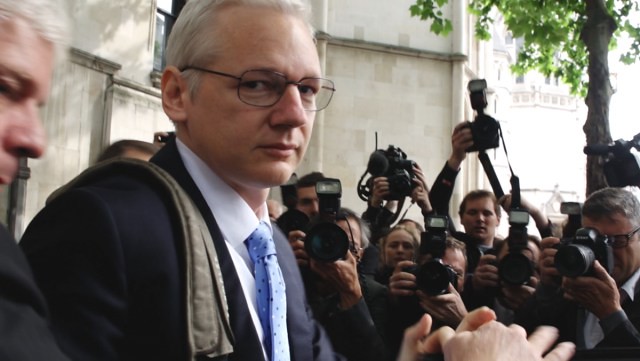
Last week, US Attorney General Jeff Sessions announced that Julian Assange's arrest is a priority of the Trump Administration. So Laura Poitras decided to go back to the editing table to add that information in before Risk, her new documentary about Assange and WikiLeaks, gets released in theaters on May 5. (it will debut on the Showtime premium channel this summer.)
Mind you, it debuted as a work in progress last May at the Cannes Film Festival. But a lot has happened since then; bigly, the US election and the Russian hack scandal. Six years in the making, Risk tries to keep up with a whirlwind of information, highlighting Poitras's unprecedented access to Wikileaks and Assange as many events around the world were unfolding.
Risk is an intense film. It starts in 2011, with Sarah Harrison, a close friend of Assange and one of the editors of WikiLeaks, trying to reach Hillary Clinton on the phone. It's a courtesy call to let her, then Secretary of State, and the US State Department know that they are about to leak some damning information. Jacob Applebaum, another editor at WikiLeaks, is seen at a telecom conference in Egypt after the Arab Spring and Abdel Fatah el-Sisi's military takeover, accusing Egyptian telecom moguls of piggybacking on the revolution, while in fact, they colluded with the Mubarak regime and restricted people's access to the internet and Twitter during it.
As the sexual assault case against Assange takes the center stage, Poitras laments that the project is not what she thought she was making, that she thought she could avoid contradiction in him, but that she was wrong. In her sporadic production log voice-overs, she asks herself, why is Assange still allowing me to film this? His ego? Is this film going to be a collateral for his game later on?
Risk does not make a devil or martyr out of Assange. This will surely disappoint and infuriate both his supporters and detractors alike. There are no new revelations, either. One thing it does is paint a grey picture of the very complicated world we are living in.
It shows that in this information age, the Orwellian dystopia where everything is black and white, and the government has total control over media, can't possibly happen. Even Kim Jung-un's North Korean regime is losing grip on its people because of widely circulating contraband South Korean TV dramas, according to a recent high official defector. But instead, we are left in the moral and ethical muck caused partly by hackers, WikiLeaks and individuals like Assange.
Risk never really answers why Assange chose to harm Clinton over Trump during the election. For someone who is in the know, his opinion seems to be pretty conventional: in his words, she is a war hawk and he is unpredictable, which was everyone else's opinion at the time. But for the sake of the argument, let's suppose WikiLeaks dumping hackers' DNC email did tip the scale in the 2016 election in favor of Trump. With the world on the brink of a nuclear war showdown, was Assange wrong about his choice in risk taking? Only time will tell.
The fact is that unlike Edward Snowden, a cleancut whistle blower and a true patriot (who also was the subject of Poitras's award-winning Citizenfour) or Chelsea Manning, a conscientious objector, Assange is rather a calculating, vain character who is in a position of great power and excercises it by his own principles, weighing the risk factors like a chess game, disregarding how his actions might affect the lives of others along the way.
I question Poitras's judgment as a filmmaker: Why did she include a clip of Applebaum jokingly comparing WikiLeaks' method to unprotected sex to roomful of women journalists out of six years of footage? With the accusations against Assange, it's a little on the nose for me.
It doesn't help when Poitras admits having a relationship with Applebaum, who turned out to be an abusive man, accused by many WikiLeaks women employees and forced out of the organization in 2013. With that, she is taking a risk here of the film being too personal to be objective, too limited by her own involvement to see the bigger picture.
Assange was upset that Poitras got the exclusive with Snowden but didn't come to him to release the tapes. So he severed the contact with her. Three years later, he contacts her again to resume filming. In an epilogue, she says Assange wasn't happy with the latest version of the film.
As we speak, WikiLeaks started to dump CIA secret documents in what seems to be the retaliation to the Sessions speech and renewed interests in extraditing Assange (or vice versa). Luckily the film ends with the info that Wikileaks already uploaded tons and tons of secret documents somewhere as a 'kill-switch option.' So just in case anything happens to the organization, they will be released to the public. Expect a lot more leaks and revelations in the years to come.
If anything, Risk shows that Assange is a man of strong principles and greatly enjoys risk-taking when stakes are high. Exposing the exposer can be a risky business. It's the one that will make people love you or hate you in this politically polarized world. Poitras seems deeply conflicted yet committed to tell the truth. And this is why Risk needs to be seen widely.
RISK will open in NY (and nationally) on May 5 at the IFC Center and the Alamo Drafthouse Brooklyn. Showtime will air it in the summer.

Last week, US Attorney General Jeff Sessions announced that Julian Assange's arrest is a priority of the Trump Administration. So Laura Poitras decided to go back to the editing table to add that information in before Risk, her new documentary about Assange and WikiLeaks, gets released in theaters on May 5. (it will debut on the Showtime premium channel this summer.)
Mind you, it debuted as a work in progress last May at the Cannes Film Festival. But a lot has happened since then; bigly, the US election and the Russian hack scandal. Six years in the making, Risk tries to keep up with a whirlwind of information, highlighting Poitras's unprecedented access to Wikileaks and Assange as many events around the world were unfolding.
Risk is an intense film. It starts in 2011, with Sarah Harrison, a close friend of Assange and one of the editors of WikiLeaks, trying to reach Hillary Clinton on the phone. It's a courtesy call to let her, then Secretary of State, and the US State Department know that they are about to leak some damning information. Jacob Applebaum, another editor at WikiLeaks, is seen at a telecom conference in Egypt after the Arab Spring and Abdel Fatah el-Sisi's military takeover, accusing Egyptian telecom moguls of piggybacking on the revolution, while in fact, they colluded with the Mubarak regime and restricted people's access to the internet and Twitter during it.
As the sexual assault case against Assange takes the center stage, Poitras laments that the project is not what she thought she was making, that she thought she could avoid contradiction in him, but that she was wrong. In her sporadic production log voice-overs, she asks herself, why is Assange still allowing me to film this? His ego? Is this film going to be a collateral for his game later on?
Risk does not make a devil or martyr out of Assange. This will surely disappoint and infuriate both his supporters and detractors alike. There are no new revelations, either. One thing it does is paint a grey picture of the very complicated world we are living in.
It shows that in this information age, the Orwellian dystopia where everything is black and white, and the government has total control over media, can't possibly happen. Even Kim Jung-un's North Korean regime is losing grip on its people because of widely circulating contraband South Korean TV dramas, according to a recent high official defector. But instead, we are left in the moral and ethical muck caused partly by hackers, WikiLeaks and individuals like Assange.
Risk never really answers why Assange chose to harm Clinton over Trump during the election. For someone who is in the know, his opinion seems to be pretty conventional: in his words, she is a war hawk and he is unpredictable, which was everyone else's opinion at the time. But for the sake of the argument, let's suppose WikiLeaks dumping hackers' DNC email did tip the scale in the 2016 election in favor of Trump. With the world on the brink of a nuclear war showdown, was Assange wrong about his choice in risk taking? Only time will tell.
The fact is that unlike Edward Snowden, a cleancut whistle blower and a true patriot (who also was the subject of Poitras's award-winning Citizenfour) or Chelsea Manning, a conscientious objector, Assange is rather a calculating, vain character who is in a position of great power and excercises it by his own principles, weighing the risk factors like a chess game, disregarding how his actions might affect the lives of others along the way.
I question Poitras's judgment as a filmmaker: Why did she include a clip of Applebaum jokingly comparing WikiLeaks' method to unprotected sex to roomful of women journalists out of six years of footage? With the accusations against Assange, it's a little on the nose for me.
It doesn't help when Poitras admits having a relationship with Applebaum, who turned out to be an abusive man, accused by many WikiLeaks women employees and forced out of the organization in 2013. With that, she is taking a risk here of the film being too personal to be objective, too limited by her own involvement to see the bigger picture.
Assange was upset that Poitras got the exclusive with Snowden but didn't come to him to release the tapes. So he severed the contact with her. Three years later, he contacts her again to resume filming. In an epilogue, she says Assange wasn't happy with the latest version of the film.
As we speak, WikiLeaks started to dump CIA secret documents in what seems to be the retaliation to the Sessions speech and renewed interests in extraditing Assange (or vice versa). Luckily the film ends with the info that Wikileaks already uploaded tons and tons of secret documents somewhere as a 'kill-switch option.' So just in case anything happens to the organization, they will be released to the public. Expect a lot more leaks and revelations in the years to come.
If anything, Risk shows that Assange is a man of strong principles and greatly enjoys risk-taking when stakes are high. Exposing the exposer can be a risky business. It's the one that will make people love you or hate you in this politically polarized world. Poitras seems deeply conflicted yet committed to tell the truth. And this is why Risk needs to be seen widely.
RISK will open in NY (and nationally) on May 5 at the IFC Center and the Alamo Drafthouse Brooklyn. Showtime will air it in the summer.
Wednesday, May 3, 2017
Languid Visual Poetry
Diamond Sutra (2012) - Bi
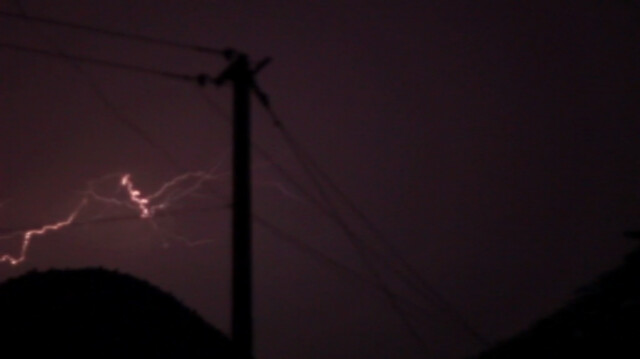
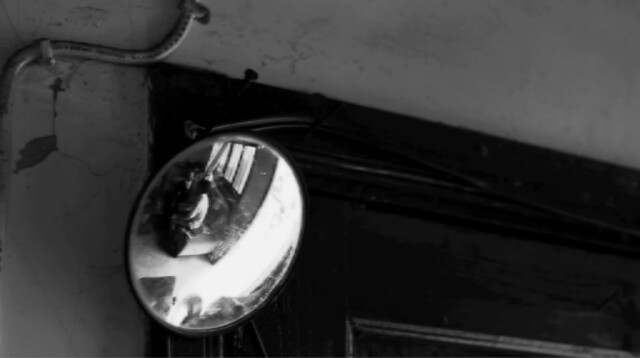
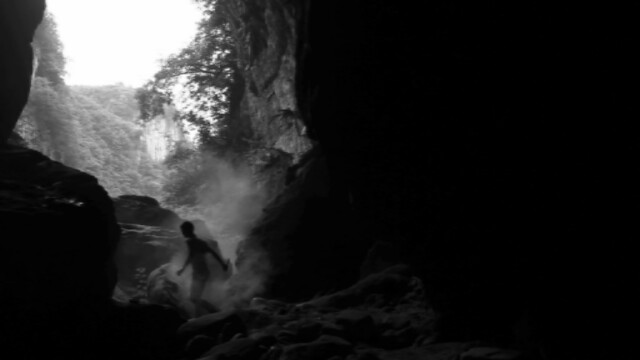
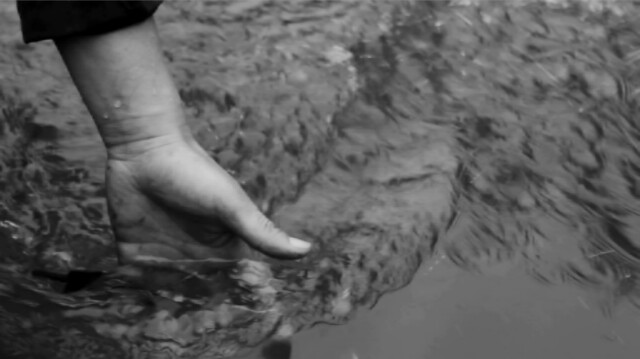
So Kaili Blues was not some fluke. Bi Gan's short, Diamond Sutra/The Poet and The Singer, before Kaili charts the same trajectory - a road movie essentially, about two criminals, there are poetry and singing and boat ride involved. All seemlessly, effortlessly mingling together. Its languid visuals and otherworldly beauty is really something to be experienced. Bi really understands cinematic language and visual poetry. Can't wait to see Bi's next project.




So Kaili Blues was not some fluke. Bi Gan's short, Diamond Sutra/The Poet and The Singer, before Kaili charts the same trajectory - a road movie essentially, about two criminals, there are poetry and singing and boat ride involved. All seemlessly, effortlessly mingling together. Its languid visuals and otherworldly beauty is really something to be experienced. Bi really understands cinematic language and visual poetry. Can't wait to see Bi's next project.
Subscribe to:
Posts (Atom)
